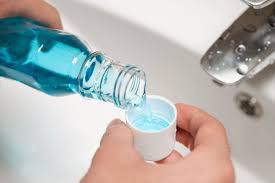The study was published online by BioRxiv, which describes itself as a preprint server for biology.
Discussing their findings, the BioRxiv scientists said, “During a 30-second exposure, two rinses containing cetylpyridinium chloride and a third with ethanol/ethyl lauroyl arginate eliminated live virus to EN14476 standards (>4-log10 reduction), while others with ethanol/essential oils and povidone-iodine (PVP-I) eliminated virus by 2- 3-log10.
“Chlorhexidine or ethanol alone had little or no ability to inactivate virus in this assay.
“Studies are warranted to determine whether these formulations can inactivate virus in the human oropharynx in vivo, and whether this might impact transmission.”
Speaking with PUNCH HealthWise on the study, President of the Nigerian Dental Association, Dr. Kolawole Obagbemiro, said the study has not yet been peer-reviewed by other scientists and that it is only proper to wait for the results of the final publication.
“While the pre-print results of the study shows promise, it is also important to see how long the effects of the mouthwashes last in reducing COVID-19 viral load in the oral cavity, as this may be helpful in reducing transmission.
“It is important to note that the pre-print results of the Cardiff study do not suggest that mouthwashes can cure COVID-19.
“While we wait for vaccination against COVID-19, I want to reiterate that the use of face masks, hand washing and social distancing remain the best preventive measures against COVID-19,” Obagbemiro said.
The dentist emphasised that the study should not stop people from adhering to the non-pharmaceutical guidelines.
“We must adhere to the routine prevention protocols like hand washing, physical distancing, and wearing masks, established by the authority,” the NDA president said.
Meanwhile, the researchers said that during the initial experiments, the effect of mouthwashes on the VeroE6/ACE2/TMPRSS2 monolayers used to detect live virus was examined, following serial dilution in Dulbecco’s Modified Eagle Medium and four of the seven products demonstrated toxicity to the monolayer, which was not eliminated until they were diluted at least 100-1,000-fold, limiting the sensitivity of the assay to measure residual infectivity.
“We, therefore, used size-exclusion chromatography to rapidly purify virus away from the products. When the virus was purified on S-400 HR microspin columns, only minimal loss of infectivity was observed, however toxicity from the mouthwashes against the cell monolayer was virtually eliminated (Fig 1B). SEC was therefore used for all assays from this point forwards.
“This approach also ensures that the activity of the mouthwashes against the virus was rapidly stopped after the desired co-incubation time. In comparison, our results suggest that ‘stopping’ the reaction by serial 10-fold dilution would leave sufficient mouthwash activity to have continued biological activity against the virus.
“Combined with the use of VeroE6/ACE2/TMPRSS2 cells for titration, which SARS-COV2 enters >1log more efficiently than parental VeroE6, the assay was capable of detecting a 5-log10 decrease in virus titre. This is more than sufficient to detect the 4-log10 reduction in activity specified by EN14476,” they said.
They added that the ability of CPC-containing mouthwashes to reduce viral infectivity is in line with studies using other enveloped viruses; similar microemulsion formulations of CPC (with a similar isopropyl myristate microemulsion as Dentyl Dual Action) have been demonstrated to exhibit both inherent antimicrobial activity and specific activity against Herpes Simplex virus, and other mouthwash formulations containing 0.07 percent CPC have been reported to reduce the infectivity of seasonal coronaviruses by 3-4-log10.
“In our study, SARS-CoV2 was even more sensitive to the CPC containing mouthwashes than in these previous reports using hCoV-229E; this may reflect the cumulative activity of additional components in these formulations.
“The SCD Max (containing CPC at a higher concentration) only resulted in a 3-log10 reduction in infectivity, and suggests that the exact formulation is important; thus, individual mouthwash formulations should be empirically tested for antiviral activity, rather than basing decisions on the ‘major’ antimicrobial component,” the researchers said.
source: Punch

 A study, which has not yet been peer-reviewed, suggests that widely-available mouthwashes can kill coronavirus within 30 seconds. The researchers say they discovered this during an experiment within 30 seconds of exposing the virus to the mouthwash in a laboratory.
A study, which has not yet been peer-reviewed, suggests that widely-available mouthwashes can kill coronavirus within 30 seconds. The researchers say they discovered this during an experiment within 30 seconds of exposing the virus to the mouthwash in a laboratory.




